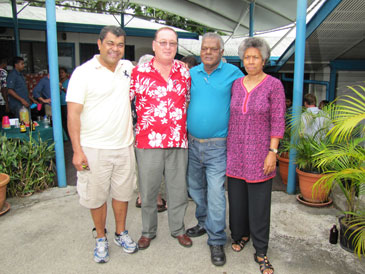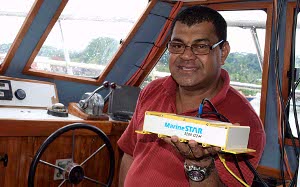Cook Islands Joins Pilot Program to Insure Against Natural Disasters
Sunday, 03 November 2013 09:37
administrator

Coverage increases to help 6 Pacific Island Nations better respond to natural disasters
The Pacific Catastrophe Risk Insurance Pilot was renewed today for its second season, with Cook Islands newly joining five other participating Pacific island countries - Marshall Islands, Samoa, Solomon Islands, Tonga, and Vanuatu - to gain insurance coverage against earthquake, tsunami and tropical cyclone risk. The second season will run from November 1, 2013 to October 31, 2014.
The insurance scheme aims to provide a rapid injection of funds in the event of a major disaster, to help governments manage the immediate costs of recovery. Access to post-disaster finance can be especially important for Pacific island countries which endure some of the highest average annual losses from natural hazards in the world – up to 6.6% of GDP.
"Becoming a member of the Pacific catastrophe risk insurance program provides us with an innovative way to work with other countries in the region and transfer some of the catastrophe risk borne by Pacific island nations to the international reinsurance market,” said Mark Brown, Minister of Finance and Economic Management for the Cook Islands. “This transaction provides us with another tool towards becoming self-reliant in disaster management, response and recovery."
The scheme’s expansion follows the request of countries during this year’s Forum Economic Ministers Meeting in Tonga to grow the program beyond the five pilot countries. Aggregate insurance coverage of the participating countries has increased from US$45 million to US$67 million, with further premium reductions for participating countries.
Last Updated on Sunday, 03 November 2013 09:43
Read more...
GSD Long Service Recognition – Profiles
Thursday, 31 October 2013 10:08
administrator

On Friday, November 1st, 2013, Secretariat of the Pacific Community's Geoscience Division (GSD), would be celebrating 11 current and former staff members who have dedicated 20 years or more to the organisation. In the days leading up to the ceremony, GSD will publish interviews of the 11 individuals, which gives an unprecedented insight into the history, advancements in service delivery and progression of technology not only within GSD, but also throughout the Pacific region.
Staff Profiles
Last Updated on Tuesday, 19 July 2016 12:24
Read more...
|
SOPAC Long Service Recognition – Dr. Russell Howorth Profile
Friday, 25 October 2013 11:33
administrator

In the years leading up to 2010, the Pacific Island leaders decided to integrate the Pacific Islands Applied Geoscience Commission (formerly known as CCOP/SOPAC) into the Secretariat of the Pacific Community. To implement this historical alignment of the two organisations, the leaders called to arms an internationally renowned geoscientist, who immediately left his well deserved retirement on Viti Levu's Coral Coast and reported to duty at Mead Road, Suva.
The then-incumbent, Dr. Russell Howorth, had been an integral part of SOPAC from its early years in the 70's, and still continues to be one of the main stalwarts of the organisation. Over the years, he has been instrumental in bringing about the prestige and recognition that SOPAC has in the region today.
A native of Yorkshire, Great Britain, Dr. Howorth did his PhD. in Geology from Victoria University of Wellington in New Zealand, after a brief stint as a mining geologist in Zambia. He first visited the fledgling CCOP/SOPAC while on secondment at the University of South Pacific (USP) in early 1979. CCOP/SOPAC was then a United Nations Development Programme (UNDP) Regional project with less than 10 staff members.
During his early years in the South Pacific, he was best known for his achievement in establishing the Certificate in Earth Science and Marine Geology. The Certificate brought three organizations -- CCOP/SOPAC, USP, and Victoria University of Wellington -- together in the early eighties to offer what was a unique opportunity for an academic course with a practical focus for geologists and technicians in the region.
Last Updated on Thursday, 10 December 2015 09:59
Read more...
SPC recognizes outstanding service to Pacific Geoscience
Wednesday, 23 October 2013 10:57
administrator

Thursday 19 September 2013, Secretariat of the Pacific Community (SPC), Suva, Fiji – On Friday, 1 November 2013, the Secretariat of the Pacific Community’s Applied Geoscience and Technology Division (SOPAC) will recognize the outstanding service of eleven employees, all of whom have given more than twenty years to the organization. The contributions of such dedicated employees have made it possible for the SOPAC Division to meet its goal of supporting the sustainable development of Pacific communities, whilst building the reputation of a reliable and effective geoscience services provider.
SOPAC has a long history in the Pacific. First established in 1972 as a United Nations Development Programme Regional Project, the South Pacific Applied Geoscience Commission, or SOPAC, initially focused on exploring Pacific mineral and hydro-carbon potential. Over the years, SOPAC’s programme of work has shifted to include coastal protection and management, geohazard assessment, water resource management, and disaster risk management. In 1990, SOPAC became an independent regional organization. In 2011, the organization integrated with the Secretariat of the Pacific Community (SPC), becoming the newest division of SPC.
The eleven employees to be recognized on 1 November 2013 have witnessed firsthand many changes within the organisation, the region and, of course, technology over the years.
Last Updated on Wednesday, 23 October 2013 11:30
Read more...
|











